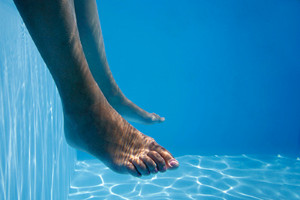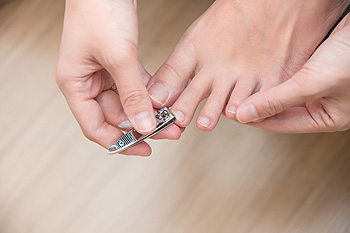 During the summer months, you may be involved in many different types of activities. Consequently, you should ensure you are wearing the best footwear possible to take care of your feet no matter where you go. If you plan on going to the beach, flip flops may be the most obvious choice of footwear to protect your feet. However, you should be careful not to wear flip-flops for too long. Although they can protect your feet from sharp objects on the ground, they can also be responsible for injuries such as ankle sprains. If you decide to go into the ocean after walking around on a sandy beach, it is recommended that you wear a pair of aqua socks to shield your feet from fragments and rocks. Another place that you may find yourself at in the warmer months is a water park. Water-friendly sandals are recommended for water parks because they can protect your feet from developing athlete’s foot and other fungal infections. Athlete’s foot is a contagious fungal infection that can easily be spread by walking on contaminated floors.
During the summer months, you may be involved in many different types of activities. Consequently, you should ensure you are wearing the best footwear possible to take care of your feet no matter where you go. If you plan on going to the beach, flip flops may be the most obvious choice of footwear to protect your feet. However, you should be careful not to wear flip-flops for too long. Although they can protect your feet from sharp objects on the ground, they can also be responsible for injuries such as ankle sprains. If you decide to go into the ocean after walking around on a sandy beach, it is recommended that you wear a pair of aqua socks to shield your feet from fragments and rocks. Another place that you may find yourself at in the warmer months is a water park. Water-friendly sandals are recommended for water parks because they can protect your feet from developing athlete’s foot and other fungal infections. Athlete’s foot is a contagious fungal infection that can easily be spread by walking on contaminated floors.
Everyday foot care is very important to prevent infection and other foot ailments. If you need your feet checked, contact one of our podiatrists from San Antonio New Step. Our doctors can provide the care you need to keep you pain-free and on your feet.
Everyday Foot Care
Often, people take care of their bodies, face and hair more so than they do for their feet. But the feet are a very important aspect of our bodies, and one that we should pay more attention to. Without our feet, we would not be able to perform most daily tasks.
It is best to check your feet regularly to make sure there are no new bruises or cuts that you may not have noticed before. For dry feet, moisturizer can easily be a remedy and can be applied as often as necessary to the affected areas. Wearing shoes that fit well can also help you maintain good foot health, as well as making it easier to walk and do daily activities without the stress or pain of ill-fitting shoes, high heels, or even flip flops. Wearing clean socks with closed shoes is important to ensure that sweat and bacteria do not accumulate within the shoe. Clean socks help to prevent Athlete’s foot, fungi problems, bad odors, and can absorb sweat.
If you have any questions please feel free to contact one of our offices located in San Antonio, TX. We offer the newest diagnostic and treatment technologies for all your foot and ankle needs.
Read more about Every Day Foot Care Hereditary Erythromelalgia, a condition more commonly known as “burning man syndrome” is a condition that causes a scorching pain in your foot. This sensation may feel as if your feet are stepping on hot coal. This pain can be caused by a light touch of air or a small splash of water. The pain can occur several times per week and it can potentially wake you up in the middle of the night. This is a rare neuropathic disorder that can cause severe burning pain and redness. The attacks of the condition is typically triggered by heat, pressure, exertion, and stress. It has been discovered that the underlying cause of this disorder is the SCN9A gene. Research has shown that similar problems in this gene may cause the hereditary type of small fiber neuropathy. If you suspect that you have a nerve disorder in your foot, you should make an appointment with your podiatrist to learn what is happening with your feet.
Hereditary Erythromelalgia, a condition more commonly known as “burning man syndrome” is a condition that causes a scorching pain in your foot. This sensation may feel as if your feet are stepping on hot coal. This pain can be caused by a light touch of air or a small splash of water. The pain can occur several times per week and it can potentially wake you up in the middle of the night. This is a rare neuropathic disorder that can cause severe burning pain and redness. The attacks of the condition is typically triggered by heat, pressure, exertion, and stress. It has been discovered that the underlying cause of this disorder is the SCN9A gene. Research has shown that similar problems in this gene may cause the hereditary type of small fiber neuropathy. If you suspect that you have a nerve disorder in your foot, you should make an appointment with your podiatrist to learn what is happening with your feet.
Neuropathy
Neuropathy can be a potentially serious condition, especially if it is left undiagnosed. If you have any concerns that you may be experiencing nerve loss in your feet, consult with one of our podiatrists from San Antonio New Step. Our doctors will assess your condition and provide you with quality foot and ankle treatment for neuropathy.
What is Neuropathy?
Neuropathy is a condition that leads to damage to the nerves in the body. Peripheral neuropathy, or neuropathy that affects your peripheral nervous system, usually occurs in the feet. Neuropathy can be triggered by a number of different causes. Such causes include diabetes, infections, cancers, disorders, and toxic substances.
Symptoms of Neuropathy Include:
Those with diabetes are at serious risk due to being unable to feel an ulcer on their feet. Diabetics usually also suffer from poor blood circulation. This can lead to the wound not healing, infections occurring, and the limb may have to be amputated.
Treatment
To treat neuropathy in the foot, podiatrists will first diagnose the cause of the neuropathy. Figuring out the underlying cause of the neuropathy will allow the podiatrist to prescribe the best treatment, whether it be caused by diabetes, toxic substance exposure, infection, etc. If the nerve has not died, then it’s possible that sensation may be able to return to the foot.
Pain medication may be issued for pain. Electrical nerve stimulation can be used to stimulate nerves. If the neuropathy is caused from pressure on the nerves, then surgery may be necessary.
If you have any questions, please feel free to contact one of our offices located in San Antonio, TX. We offer the newest diagnostic and treatment technologies for all your foot care needs.
Read more about Neuropathy There are many different things that may cause an ingrown toenail to develop. One of the most common causes is wearing shoes that are too tight along with socks and tights. You may also develop an ingrown toenail if you improperly trim your toenail. If you are looking to trim your nails, it is advised that you trim straight across instead of in a rounded shape. If you have an ingrown toenail and want to prevent it from becoming infected, it is crucial that you keep your feet clean. However, if the condition worsens and becomes severe, you may need to have surgery. If you are experiencing any pain and suspect that you have an ingrown toenail, you should see your podiatrist for treatment.
There are many different things that may cause an ingrown toenail to develop. One of the most common causes is wearing shoes that are too tight along with socks and tights. You may also develop an ingrown toenail if you improperly trim your toenail. If you are looking to trim your nails, it is advised that you trim straight across instead of in a rounded shape. If you have an ingrown toenail and want to prevent it from becoming infected, it is crucial that you keep your feet clean. However, if the condition worsens and becomes severe, you may need to have surgery. If you are experiencing any pain and suspect that you have an ingrown toenail, you should see your podiatrist for treatment.
Ingrown toenails can become painful if they are not treated properly. For more information about ingrown toenails, contact one of our podiatrists of San Antonio New Step. Our doctors can provide the care you need to keep you pain-free and on your feet.
Ingrown Toenails
Ingrown toenails occur when a toenail grows sideways into the bed of the nail, causing pain, swelling, and possibly infection.
Causes
Prevention
Because ingrown toenails are not something found outside of shoe-wearing cultures, going barefoot as often as possible will decrease the likeliness of developing ingrown toenails. Wearing proper fitting shoes and using proper cutting techniques will also help decrease your risk of developing ingrown toenails.
Treatment
Ingrown toenails are a very treatable foot condition. In minor cases, soaking the affected area in salt or antibacterial soaps will not only help with the ingrown nail itself, but also help prevent any infections from occurring. In more severe cases, surgery is an option. In either case, speaking to your podiatrist about this condition will help you get a better understanding of specific treatment options that are right for you.
If you have any questions please feel free to contact one of our offices located in San Antonio, TX. We offer the newest diagnostic and treatment technologies for all your foot and ankle needs.
Read more about Ingrown Toenail Care